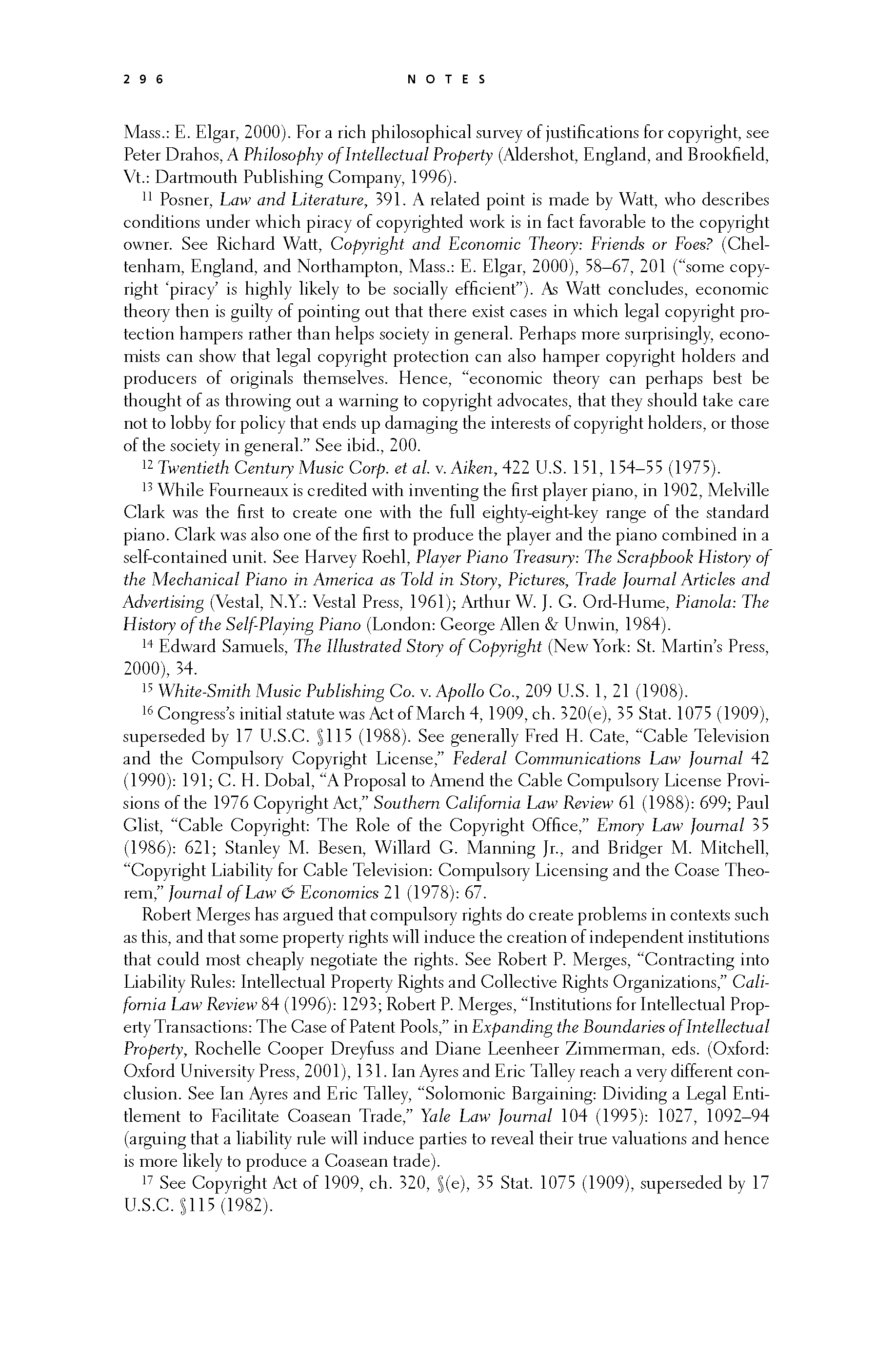 p295 _
-chap- _
toc-1 _
p296w _
toc-2 _
+chap+ _
p297
p295 _
-chap- _
toc-1 _
p296w _
toc-2 _
+chap+ _
p297
Mass.: E. Elgar, 2000). For a rich philosophical survey of justifications for copyright, see
Peter Drahos, _A_Philosophy_of_Intellectual_Property_ (Aldershot, England, and Brookfield,
Vt.: Dartmouth Publishing Company, 1996).
[7-11] Posner, _Law_and_Literature,_ 391. A related point is made by Watt, who describes
conditions under which piracy of copyrighted work is in fact favorable to the copyright
owner. See Richard Watt, _Copyright_and_Economic_Theory:_Friends_or_Foes?_ (Chel-
tenham, England, and Northampton, Mass.: E. Elgar, 2000), 58-67, 201 ("some copy-
right 'piracy' is highly likely to be socially efficient"). As Watt concludes, economic
theory then is guilty of pointing out that there exist cases in which legal copyright pro-
tection hampers rather than helps society in general. Perhaps more surprisingly, econo-
mists can show that legal copyright protection can also hamper copyright holders and
producers of originals themselves. Hence, "economic theory can perhaps best be
thought of as throwing out a warning to copyright advocates, that they should take care
not to lobby for policy that ends up damaging the interests of copyright holders, or those
of the society in general." See ibid., 200.
[7-12] _Twentieth_Century_Music_Corp._et_al._ v. _Aiken,_ 422 U.S. 151, 154-155 (1975).
[7-13] While Fourneaux is credited with inventing the first player piano, in 1902, Melville
Clark was the first to create one with the full eighty-eight-key range of the standard
piano. Clark was also one of the first to produce the player and the piano combined in a
self-contained unit. See Harvey Roehl, _Player_Piano_Treasury:_The_Scrapbook_History_of_
_the_Mechanical_Piano_in_America_as_Told_in_Story,_Pictures,_Trade_Journal_Articles_and_
_Advertising_ (Vestal, N.Y.: Vestal Press, 1961); Arthur W. J. G. Ord-Hume, _Pianola:_The_
_History_of_the_Self-Playing_Piano_ (London: George Allen & Unwin, 1984).
[7-14] Edward Samuels, _The_Illustrated_Story_of_Copyright_ (New York: St. Martin's Press,
2000), 34.
[7-15] _White-Smith_Music_Publishing_Co._ v. _Apollo_Co.,_ 209 U.S. 1, 21 (1908).
[7-16] Congress's initial statute was Act of March 4, 1909, ch. 320(e), 35 Stat. 1075 (1909),
superseded by 17 U.S.C. #115 (1988). See generally Fred H. Cate, "Cable Television
and the Compulsory Copyright License," _Federal_Communications_Law_Journal_ 42
(1990): 191; C. H. Dobal, "A Proposal to Amend the Cable Compulsory License Provi-
sions of the 1976 Copyright Act," _Southern_California_Law_Review_ 61 (1988): 699; Paul
Glist, "Cable Copyright: The Role of the Copyright Office," _Emory_Law_Journal_ 35
(1986): 621; Stanley M. Besen, Willard G. Manning Jr., and Bridger M. Mitchell,
"Copyright Liability for Cable Television: Compulsory Licensing and the Coase Theo-
rem," _Journal_of_Law_&_Economics_ 21 (1978): 67.
Robert Merges has argued that compulsory rights do create problems in contexts such
as this, and that some property rights will induce the creation of independent institutions
that could most cheaply negotiate the rights. See Robert P. Merges, "Contracting into
Liability Rules: Intellectual Property Rights and Collective Rights Organizations," _Cali-_
_fornia_Law_Review_ 84 (1996): 1293; Robert P. Merges, "Institutions for Intellectual Prop-
erty Transactions: The Case of Patent Pools," in _Expanding_the_Boundaries_of_Intellectual_
_Property,_ Rochelle Cooper Dreyfuss and Diane Leenheer Zimmerman, eds. (Oxford:
Oxford University Press, 2001), 131. Ian Ayres and Eric Talley reach a very different con-
clusion. See Ian Ayres and Eric Talley, "Solomonic Bargaining: Dividing a Legal Enti-
tlement to Facilitate Coasean Trade," _Yale_Law_Journal_ 104 (1995): 1027, 1092-94
(arguing that a liability rule will induce parties to reveal their true valuations and hence
is more likely to produce a Coasean trade).
[7-17] See Copyright Act of 1909, ch. 320, #(e), 35 Stat. 1075 (1909), superseded by 17
U.S.C. #115 (1982).
[[296]]
p295 _
-chap- _
toc-1 _
p296w _
toc-2 _
+chap+ _
p297